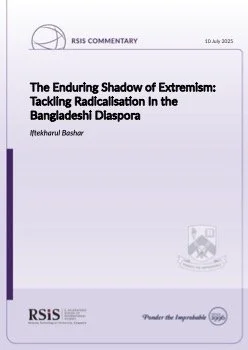By Iftekharul Bashar
The recent arrests in Malaysia confirm that radicalisation within the Bangladeshi diaspora is a significant and evolving threat. This problem stems from socioeconomic factors, homeland instability, and online recruitment. A transparent, collaborative, and multi-faceted P/CVE (Preventing and Countering Violent Extremism) approach is essential to mitigate the risk.
COMMENTARY
Malaysian authorities recently arrested 36 Bangladeshi citizens in Selangor and Johor for their involvement in a radical militant movement promoting Islamic State (IS) ideology. Home Minister Datuk Seri Saifuddin Nasution Ismail reported that these individuals were forming recruitment cells, fundraising for terrorism, and plotting to overthrow the Bangladesh government.
Notably, the network, as detailed by police, raised funds using international fund transfer services and e-wallets, directing money to the IS group in Syria and Bangladesh. This method highlights a growing trend in terrorist financing, leveraging the speed, lower costs, and often less stringent oversight of digital platforms and cross-border money movement to facilitate illicit financial flows globally.
Of those arrested, five have been charged with terrorism-related offences, 15 face deportation, and 16 remain under investigation, with the police anticipating further arrests. Malaysian authorities estimate that 100 to 150 individuals are suspected to be involved in this network, demonstrating the scale of the threat they are actively dismantling.
These arrests are a stark reminder that the threat of extremism continues to cast a long shadow, not just within Bangladesh’s national borders but also across diaspora communities. The arrest of the 36 nationals is not an isolated incident. There have been previous cases of radicalisation of Bangladeshis in Malaysia.
In May 2019, a 28-year-old Bangladeshi mechanic was arrested in Kuala Kedah; he had possessed the necessary chemicals and expertise to produce improvised explosive devices (IEDs). Earlier in January 2017, two Bangladeshi salesmen, aged 27 and 28, were arrested in Kuala Lumpur, reportedly for having ties with suspected IS militants in Bangladesh and for planning to join a terror cell in the southern Philippines.
Singapore, among other nations, has also experienced similar cases in the past, notably in 2015, 2016, and 2020, highlighting a recurring pattern of Bangladeshi diaspora members being targeted and recruited by terrorist networks, including the Islamic State.
S. Rajaratnam School of International Studies, NTU Singapore, 2025. 6p.


